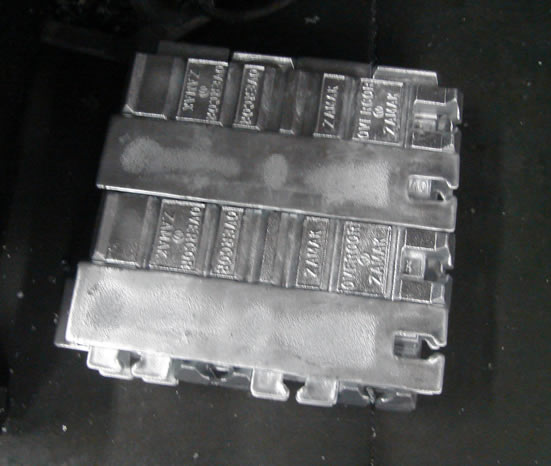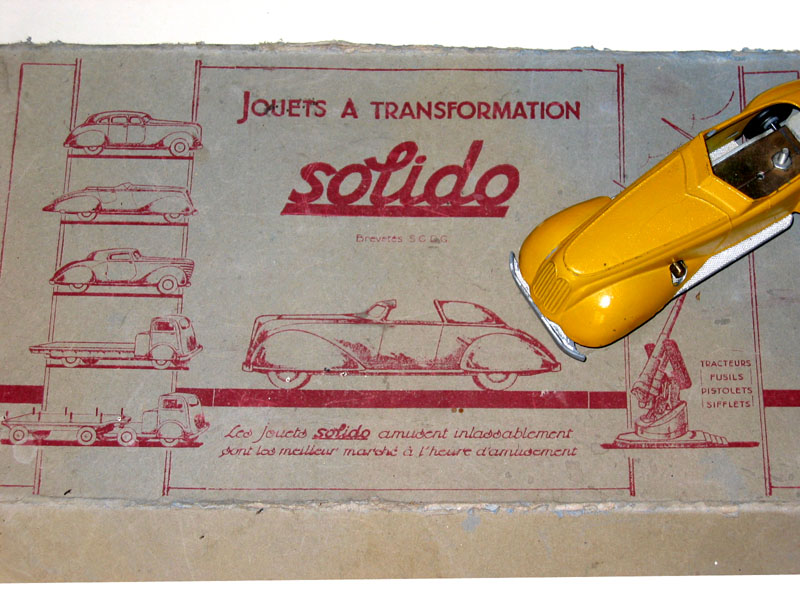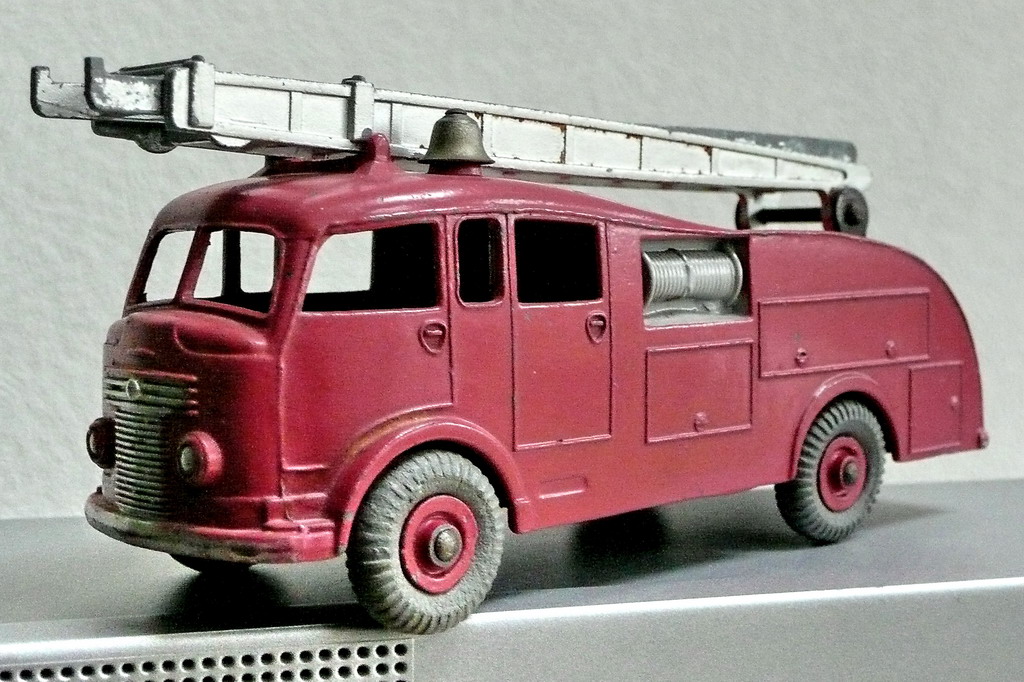|
Sablon Diecast
Sablon was a Belgian company near Brussels that made diecast zamac toy cars in the late 1960s and early 1970s. Models were mostly in 1:43 scale and were similar in concept to Dinky Toys or Solido. History In 1968 the Sablon firm introduced nine 1:43 scale diecast models. This range consisted of a BMW 1600, a BMW 2000 coupe, a BMW 1600 GT Glas fastback coupe, a BMW Glas 3000 V-8 (which appears to be Italian bodied), a Porsche 911 Targa, a Mercedes 280 sedan, an NSU ro80 (which appeared to be a Danish Tekno knockoff), a Renault 16 sedan, and a Lamborghini Marzal (from Dinky tooling?):nl:Sablon, Netherlands Wikipedia. Detail was quite good for most models and all apertures usually opened – and seams fit finely together. In detail and precision models were similar to French Solido or German Schuco Modell, Schuco. Similar to Solido headlights were often clear plastic lenses and not jewels as seen in Corgi Toys, Corgi or Dinky. Each model was offered painted in two or three colors. T ... [...More Info...] [...Related Items...] OR: [Wikipedia] [Google] [Baidu] |
Zamac
ZAMAK (or Zamac, formerly trademarked as MAZAK) is a family of alloys with a base metal of zinc and alloying elements of aluminium, magnesium, and copper. Zamak alloys are part of the zinc aluminium alloy family; they are distinguished from the other ZA alloys because of their constant 4% aluminium composition. The name ''zamak'' is an acronym of the German names for the metals of which the alloys are composed: (zinc), , and (copper). The New Jersey Zinc Company developed zamak alloys in 1929. The most common zamak alloy is zamak 3. Besides that, zamak 2, zamak 5 and zamak 7 are also commercially used. These alloys are most commonly die cast. Zamak alloys (particularly #3 and #5) are frequently used in the spin casting industry. A large problem with early zinc die casting materials was zinc pest, owing to impurities in the alloys. Zamak avoided this by the use of 99.99% pure zinc metal, produced by New Jersey Zinc's use of a refluxer as part of the smelting process. Zamak ... [...More Info...] [...Related Items...] OR: [Wikipedia] [Google] [Baidu] |
Dinky Toys
Dinky Toys was the brand name for a range of die-cast zamak zinc alloy scale model vehicles produced by British toy company Meccano Ltd. They were made in England from 1934 to 1979, at a factory in Binns Road in Liverpool. Dinky Toys were among the most popular die-cast vehicles ever made – pre-dating other popular die-cast marques, including Corgi, Matchbox and Mattel's Hot Wheels. Vehicles commercialised under the "Dinky" name include cars, trucks, aircraft, military, ships. Pre-war history Frank Hornby established Meccano Ltd. in 1908 to make metal construction sets. The company later moved into model railways, with its O gauge clockwork trains appearing in 1920. In the early 1930s, Meccano made many types of tinplate and other metal cars, such as its Morgan and BSA three-wheelers, mostly in kit form. In 1933, Meccano Ltd issued a series of railway and trackside accessories to complement its O gauge (1/45) Hornby Trains model railway sets. The accessories were first ... [...More Info...] [...Related Items...] OR: [Wikipedia] [Google] [Baidu] |
Solido
Solido is a French manufacturing company based in Oulins, west of Paris, which produces die-cast scale model cars, military vehicles, and commercial vehicles. Vehicles are usually made of zamac alloy in varying scales. Typically, Solido's main competition in France was Norev, but internationally, Polistil, Corgi Toys, Dinky Toys, Mercury, and Tekno produced similar style toys. History "Solido" was the brand name established in 1930 by Ferdinand de Vazeilles of the "Fonderie de précision de Nanterre" in the western Paris suburb of Nanterre, France. The company was one of the first European firms to champion the "virtues of unbreakable diecast metal". Vazeilles' first product was a metal Gergovia brand spark plug on wheels. In 1932, some of the first vehicle kits were made in Zamac, labeled with the theme "toys with transformations" referring to their various bodies fitting on standard chassis, like the real coach builders and car manufacturers did at that time. Some were ... [...More Info...] [...Related Items...] OR: [Wikipedia] [Google] [Baidu] |
Schuco Modell
Schuco is a German manufacturing company founded in 1912 by Heinrich Müller and the businessman Heinrich Schreyer in Nuremberg Germany's toy capital since early days. The company's specialty was making toy reproductions of cars and trucks in tin, plastic and die-cast. The company went bankrupt in 1976 but was reorganized in 1993 and then totally independent again by 1996. Some of the products currently commercialised by Schuco include die-cast scale model cars, aircraft, ships, and commercial vehicles History Originally named Spielzeugfirma Schreyer & Co, the company changed its name to the more succinct Schuco in 1921 (likely a derivation of Schreyer und Company. At its beginnings, the company made unique clockwork tin toys. Some of these were clever in that, instead of using a key, one would wind an arm or another feature. In the 1920s Schuco introduced its famous Pick-Pick bird (over 20 million were made up until the 1960s). A wind-up mouse, a dancing mouse and tro ... [...More Info...] [...Related Items...] OR: [Wikipedia] [Google] [Baidu] |
Corgi Toys
Corgi Toys (trademark) is the brand name of a range of die-cast toy vehicles created by Mettoy and currently owned by Hornby Railways, Hornby.Retail on ''The Guardian'' The Mettoy ("Metal Toy") company was founded in 1933 by German people, German émigré Philip Ullmann in Northampton, England, where he was later joined by South African people, South African-born Germans in Africa, German Arthur Katz, who had previously worked for Ullmann at his toy company Tipp and Co of Nuremberg. After dabbling for some years in the model car market, they decided to produce a range of die-cast toy vehicles as competition to Meccano's Dinky Toy, Dinky model cars, which had dominated the British market for many years. "Corgi Toys" were introduced in the UK in July 1956 and were manufactured in Swansea, Wales, for 27 years before the company went ... [...More Info...] [...Related Items...] OR: [Wikipedia] [Google] [Baidu] |
Chocolat Jacques
Chocolat Jacques is a Belgian firm that was founded in Verviers in 1896, by Antoine Jacques (1858-1929). Production was later moved to Bruges and Eupen in the east of Belgium, where its headquarters have also been located since 1923. History In 1890, the trained confectioner Antoine Jacques, together with Jean Joseph Hardy, opened the first factory in Verviers under the name "Gingerbread Factory Hardy and Jacques, Verviers" and just one year later won a gold medal at the Liège Economic Exhibition. In 1894 they expanded their production to chocolate products and made this apparent in their new company name "Chocolate and gingerbread Hardy and Jacques, Verviers". In 1895, Jacques bought his first steam engine and parted ways with his partner Hardy a year later. From then on he ran his company for gingerbread, confectionery and chocolates alone with around 43 employees and was then known as "A. Jacques". In 1899, Jacques suffered a severe setback when a fire broke out in his facto ... [...More Info...] [...Related Items...] OR: [Wikipedia] [Google] [Baidu] |
Die-cast Toys
A die-cast toy is a toy or a collectible model produced by using the die-casting method of putting molten lead, zinc alloy or plastic in a mold to produce a particular shape. Such toys are made of metal, with plastic, rubber, glass, or other machined metal parts. Wholly plastic toys are made by a similar process of injection molding, but the two methods are distinct because of the properties of the materials. Process The metal used in die-casting is either a lead alloy (used early on), or more commonly, Zamak (called ''Mazak'' in the UK), an alloy of zinc with small quantities of aluminium and copper. Lead or iron are impurities that must be carefully avoided in Zamac, as they give rise to a deterioration of the metal most commonly called zinc pest. The terms white metal or pot metal are also used when applied to alloys based more on lead or iron. The most common die-cast vehicles are scale models of automobiles, aircraft, military vehicles, construction equipment, and tr ... [...More Info...] [...Related Items...] OR: [Wikipedia] [Google] [Baidu] |
Model Manufacturers Of Belgium
A model is an informative representation of an object, person or system. The term originally denoted the Plan_(drawing), plans of a building in late 16th-century English, and derived via French and Italian ultimately from Latin ''modulus'', a measure. Models can be divided into physical models (e.g. a model plane) and abstract models (e.g. mathematical expressions describing behavioural patterns). Abstract or conceptual models are central to philosophy of science, as almost every scientific theory effectively embeds some kind of model of the universe, physical or human condition, human sphere. In commerce, "model" can refer to a specific design of a product as displayed in a catalogue or show room (e.g. Ford Model T), and by extension to the sold product itself. Types of models include: Physical model A physical model (most commonly referred to simply as a model but in this context distinguished from a conceptual model) is a smaller or larger physical copy of an physical ... [...More Info...] [...Related Items...] OR: [Wikipedia] [Google] [Baidu] |






